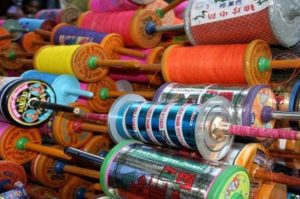Chinese Manja Crackdown in Kolkata: Kolkata witnessed a grim reminder of the dangers of Chinese manja when a 48-year-old former Army jawan, Gautam Ghosh, lost his life on Vishwakarma Puja day. While riding his motorcycle on the Kalyani Expressway near Rahara, a sharp glass-coated nylon kite string slit his throat. Despite wearing a helmet, the manja tightened around his neck, causing severe bleeding that led to his death on the way to the hospital.

The tragedy triggered widespread outrage, leading the Barrackpore Commissionerate police to launch a coordinated enforcement drive across multiple jurisdictions.
Chinese Manja Crackdown in Kolkata: Arrests and Seizures
During the operation, police arrested 14 individuals linked to the sale and storage of banned Chinese manja. Raids were carried out in Khardah, Titagarh, New Barrackpore, Mohanpur, and Wireless More in Barrackpore, leading to the seizure of 150 rolls of synthetic, glass-coated threads.
All 14 accused were produced in court the following day. Officials confirmed that further investigations are underway to dismantle the supply chain and identify wholesale suppliers.
What Is Chinese Manja and Why Is It Banned?
- Composition: Unlike traditional cotton threads, Chinese manja is made from nylon or synthetic fibers coated with powdered glass and metallic substances.
- Hazards: It is extremely sharp, non-biodegradable, and causes fatal injuries to humans, damages power lines, and leads to bird deaths.
- Environmental Risk: Being synthetic, the thread persists in the environment, entangling trees, electric wires, and water bodies.
The National Green Tribunal (NGT) has banned synthetic manja nationwide since 2017, citing environmental and public safety risks. The ban is enforced under the Environment (Protection) Act, 1986, and violators face strict legal action.
🔗 Read more on NGT’s order here
Laws and Enforcement
- Environment (Protection) Act, 1986: Manufacture, storage, and sale of synthetic manja is a punishable offense.
- Indian Penal Code (IPC): Sections relating to negligence and endangering human life can be applied.
- State Notifications: Several states, including West Bengal, have issued separate bans and advisories to enforce prohibition.
Despite these legal frameworks, illegal markets thrive due to poor enforcement and consumer demand, especially around festivals.
Why Chinese Manja Continues to Be a Menace
- Easy Availability – Even after repeated crackdowns, Chinese manja is often sold in local shops under disguise.
- Festive Demand – Kite flying during Makar Sankranti, Independence Day, and Vishwakarma Puja keeps the market alive.
- Lack of Awareness – Many buyers remain unaware of its legal ban and deadly consequences.
- Weak Monitoring – Policing every small vendor in crowded urban neighborhoods remains a daunting task.
Impact on Human Lives
The death of Gautam Ghosh has once again highlighted the human cost of negligence. In many Indian cities, commuters—particularly bikers and pedestrians—are at constant risk. Helmets, while useful, cannot fully shield against razor-sharp synthetic threads.
Past incidents across India have also claimed children’s lives and caused permanent injuries. Public anger tends to spike after such deaths, but enforcement weakens with time.
Wildlife and Environmental Damage
Animal rescue organizations report that hundreds of birds are injured every year due to entanglement in manja. Their wings, necks, and legs are often cut so deeply that survival becomes impossible.
Wildlife SOS, an NGO working on this issue, states that discarded Chinese manja is one of the biggest threats to urban bird populations.
🔗 Learn more from Wildlife SOS
Steps Taken by Authorities
- Seizures and Arrests: Immediate crackdown led to multiple arrests and confiscations of manja rolls.
- Market Surveillance: Police have promised increased surveillance in crowded markets ahead of festive seasons.
- Awareness Drives: Authorities plan campaigns to warn about the risks of using Chinese manja.
What Needs to Be Done
While arrests mark a strong beginning, experts believe the crackdown must be sustained and proactive. Recommendations include:
- Regular inspections of kite-selling shops.
- Awareness campaigns in schools, colleges, and community centers.
- Severe penalties for repeat offenders.
- Promotion of eco-friendly cotton threads as safe alternatives.
- Strict monitoring around major festivals when kite flying peaks.
Comparisons Across India
This is not just a Bengal issue. Other states like Delhi, Maharashtra, Gujarat, and Telangana have witnessed similar tragedies. Despite bans, black markets supply synthetic manja every year.
For example:
- In Delhi, multiple cases of death and injury led to large seizures before Independence Day celebrations.
- In Hyderabad, police regularly invoke the Environment Protection Act to curb sales.
- In Mumbai, NGOs work with police to warn kite flyers during Makar Sankranti.
Conclusion
The Chinese manja crackdown in Kolkata, which resulted in 14 arrests, underscores a critical reality: laws alone cannot prevent tragedies unless coupled with consistent enforcement and public awareness.
The tragic death of Gautam Ghosh should serve as a wake-up call for authorities and citizens alike. Festivals must remain celebrations of life, not occasions marred by preventable deaths.
Until stricter action is maintained, Chinese manja will continue to silently endanger commuters, birds, and the environment.
🔗 Useful External References:
Also read: Home | Channel 6 Network – Latest News, Breaking Updates: Politics, Business, Tech & More

